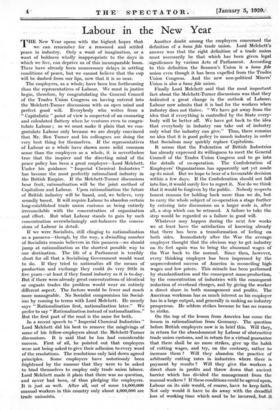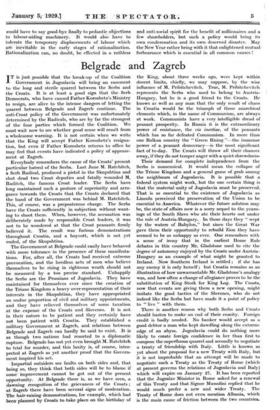Labour in the New Year T HE New Year opens with
the highest hopes that we can remember for a reasoned and settled peace in industry. Only a want of imagination, or a want of boldness wholly inappropriate to the days in which we live, can deprive us of this incomparable boon. There have already been unnecessary delays in settling conditions of peace, but we cannot believe that the cup will be dashed from our lips, now that it is so near.
The employers, as a whole; have been less forthcoming than the representatives of Labour. We must in justice begin, therefore, by congratulating the General Council of the Trades Union Congress on having entered into the Melehett-Turner discussions with an open mind and perfect good will. Everybody who writes from a " Capitalistic " point of view is suspected of an ensnaring and calculated flattery when he ventures even to congra- tulate Labour ; so we must make it plain that we con- gratulate Labour only because we are deeply convinced that Mr. Beri Turner and his colleagues are doing- the very best thing for themselves. If the representatives of Labour as a whole have shown more solid common sense than the employers as a whole, it is nevertheless true that the inspirer and the directing mind of the peace policy has been a great employer—Lord Melehett. Under his guidance " Imperial Chemical Industries " has become the most perfectly rationalized industry in the British Empire. If the Melchett-Turner discussions bear fruit, rationalization will be the joint method of Capitalism and Labour. Upon rationalization the future of British industry will be based, and, we believe, very soundly based. It will require Labour to abandon certain long-established trade union customs as being entirely irreconcilable with the concentration of organization and effort. But what Labour stands to gain by such concentration overwhelmingly out-balances the conces- sions of Labour in detail.
If we were Socialists, still clinging, to nationalization as a panacea—though, by the way, a dwindling number of Socialists remain believers in this panacea—we should jump at rationalization as the shortest possible way to our destination. The life of a Parliament is terribly short for all that a Socialising Government would want to do. If they tried to nationalize all the means of production and exchange they could do very little in five years—at least if they found industry as it is to-day. But if there were already great concentrations of identical or cognate trades the problem would wear an entirely different aspect. The factors would be fewer and much more manageable. No Socialist compromises his Social- iSm by coming to terms with Lord Melchett. He merely says- " Rationalization first, nationalization .later." We prefer to say " Rationalization instead of nationalization." But the first part of the road is the same for both.
In a recent speech to " Imperial Chemical Industries " Lord Melchett did his best to remove the misgivings of some of his fellow-employers about the Melchett-Turner discussions. It is said -that he has had considerable success: First of all, he pointed out that employers were not being asked to give their adhesion to every word of the resolutions. The resolutions only laid down agreed principles. Some employers have notoriously been frightened by the' rumour that they were to be asked to bind themselves to employ only trade .union labour. Lord- Melchett made it plain that there was no question, and never had been, of thus pledging the employers. It is just as •well. After all, out of some 14,000,000 manual workers in this country only about 4,000,000 are trade unionists. Another doubt among the employers concerned the definition of a bona fide trade union. Lord Melchett's answer was that the right definition of a trade union must necessarily be that which has been given legal significance by_ various Acts of Parliament. According to this definition the Seamen's Union is a bona fide union even though it has been expelled from the Trades; Union Congress. And the new non-political Miners' Union is also a bona fide union.
Finally Lord Melchett said that the most important fact about the Melehett-Turner discussions was that they indicated a great change in the outlook of Labour. Labour now admits that it is bad for the workers when industry does not thrive. " We have got away from the idea that if everything is controlled by the State every- body will be better off. We have got back to the idea that everybody in industry can take out of industry only what the' industry can give." Thus, there remains no idea that it is good policy to smash industry in order that Socialism may quickly replace Capitalism.
It seems that the Federation of British Industries has already expressed its willingness to meet the. General Council of the Trades Union Congress and to go into the details of co-operation. The Confederation of Employers' Organizations has apparently not yet made. up its mind. But we hope to hear of a favourable decision within a few days. If the Confederation should not fall into line, it would surely live to regret it. Nor do we think that it would be forgiven by the public. Nobody respects honest reasons for holding back more than we do, but to carry the whole subject of co-operation a stage nuttier by entering into discussions on a larger scale is, after all, a step which can be retraced. A failure to take the step would be regarded as a failure in good will.
Whatever may happen during the next few weeks we at least have the satisfaction of knowing already that there has been a transformation of feeling on both sides. Immediately after the War the average employer thought that the obvious way to get industry on its feet again was to bring the abnormal wages of the War back to the normal. Since then, however, every thinking employer has been impressed by the unprecedented success of America in reconciling high wages and low prices. This miracle has been performed by standardization and the consequent mass-production, by the concentration of industries with the consequent reduction of overhead charges, and by giving the worker a direct share in both management and profits. The American workman has as much interest as his employer has in a large output, and generally in making an industry prosperous. He seldom strikes because he has no reason to strike.
On the top of the lesson from America has come the lesson in rationalization from" Germany. The question before British employers now is in brief this. Will they, in return for the abandonment by Labour of obstructive trade union customs, and in return for a virtual guarantee that there shall be no more strikes, give up the habit of cutting wages, and try, on the contrary, rather to increase them ? Will they abandon the practice of arbitrarily cutting rates in industries where there is payment by results ? Will they give the, workers a direct share in profits and throw down that ancient barrier which has divided the management from the manual workers ? If these conditions could be agreed uporig Labour on its side would, of course, have to keep faith. Not only would it have to do away with. the dreadful loss of working time which used to be incurred, , but it would have to say good-bye finally to pedantic objections to labour-aiding machinery. ' It would al.sO -, have to tolerate the temporary displacements of labour which ate inevitable in the early stages of rationalization. Rationalization can, no doubt, be effected in a ruthless and anti-social spirit for the benefit of millionaires and a few shareholders, but such a policy would bring its own condemnation and its own deserved disaster. May the New Year rather bring with it that enlightened mutual, forbearance which is essential in all common causes !







































 Previous page
Previous page